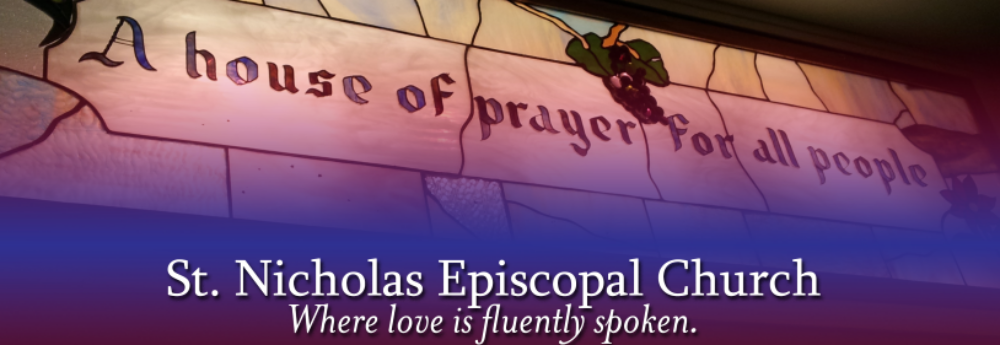Somehow, we managed to do the Pentecost readings in our many different languages, even though a person or persons unknown had moved Father Ted’s reading marker, and he began reading something completely other than we were expecting.
After a few seconds’ tense silence on our part, wordless communication was exchanged somehow and he began with the words “Philip said to Jesus, “Lord, show us the Father, and we will be satisfied.” That was our cue.
All was well; very quickly a torrent of languages grew around the sanctuary. Some spoke more quickly and finished earlier, and some had more of a mouthful to pronounce and trailed off at the end.
Fr. Ted’s sermon enlarged on the theme of differences between people, and communication in general. Even the slight hiccup at the beginning, he said, caused an interesting tension and gave our several readings the feeling of pent-up energy released (and not a little relief that we hadn’t messed up).
Fr. Ted took as his “text” not only the Gospel reading for Pentecost, John 14 8-17, but events and characters from the movie
Chocolat. In that movie, outsiders visiting an otherwise charming French village were treated very badly, because it was run like a medieval fiefdom by a member of the old aristocratic class, a real French count. And even villagers were treated badly, because they had to toe the old man’s very rigid line, and the local priest had to suffer the indignity of having his sermons written for him.
And then a dangerous newcomer moved to town and opened a very threatening business, right in the middle of Lent: a gourmet chocolate shop.
This beautiful chocolatier didn’t attend church, treated everybody the same, and didn’t knuckle under to social pressure to conform. And it’s a good thing, because she single-handedly reconnected the villagers with passion, whether it be for food, life, or love. Even the village priest was inspired to give a moving Easter sermon while his patron lay unconscious in the shop window, about how Jesus wants us to live our lives for ourselves and others, and not mindlessly following rules.
There was something magical in the chocolate – but it was not an easy or a quick fix. Some characters struggled with the way others saw them and as they saw themselves, but most emerged better for it (with the exception of the count, who ended up passed out in the display window of the chocolate shop after a disastrous attempt to destroy the shop). A new spirit of tolerance and acceptance filled the little village, and people were much happier and more content.
As it happens, the French passion for fine, rich chocolate and good food in general is explained a little further in the current best seller French Women Don’t Get Fat. It’s an interesting book, but places a little too much emphasis on drinking Champagne with nearly every meal (the author is an executive with a well-known French Champagne house).
The ultimate lesson learned from the movie, aside from always insisting on fine chocolate and savoring it in small but rich bites, is that life should be lived with passion and joy, and that change should be embraced. And that people who are different from us often have the most to teach. We certainly experienced the differences Sunday, as we all struggled to pronounce French, Estonian, Polish, Spanish, Norwegian, Italian, Latin and Greek…many languages, but all saying the same thing.


